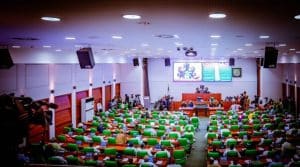- Home
- Features
- Business
- Active
- Sports
- Shop
Top Insights


The Federal Government’s recent decision to set the minimum age for candidates sitting for the Senior Secondary School Certificate Examination (SSSCE) at 18 may be here to stay, according to the House of Representatives Committee on Basic Education.
This development follows an announcement by the Minister of Education, Prof. Tahir Mamman, in July, stating that from 2025, students under the age of 18 would no longer be allowed to sit for the exam.
The SSSCE is a crucial prerequisite for students seeking admission into higher institutions.
The policy announcement has sparked heated debate among parents, educators, and other education stakeholders.
Some parents have expressed concern that the new policy could delay the progress of younger students who excel academically but are not yet 18.
On the other hand, supporters argue that the policy will ensure students have a mature understanding of academic and social responsibilities before entering tertiary institutions.
The Chairman of the House of Representatives Committee on Basic Education, Mark Useni, in an interview with Punch, gave reasons the Federal Government might not likely reverse the decision.
He said, “The Committees on Basic Education and Examination Boards took this matter to the leadership of the House of Representatives. The Speaker, Tajudeen Abbas, promptly appointed the House Leader, Prof Julius Ihonvere, to moderate a meeting between the two committees and the Minister of Education, Prof Tahir Mamman.
“The meeting was held on Wednesday, September 4, and the minister attended together with the Minister of State for Education, Dr Tanko Sununu, as well as the heads of basic education examination bodies.
“The minister explained that the policy that relates to the 18 years age requirement for entry into the university is a policy that was developed before the adoption of the 6-3-3-4 system. He explained that the policy also has a root in the Universal Basic Education Act.
“Prof Tahir said the policy is not peculiar to Nigeria, while also making reference to military and paramilitary institutions which place the entry age at 18 years. He also said that the voting age in Nigeria is pegged at 18 years.”
He said Useni frowned on the situation where children not older than 12 “are being made to seek admission into universities.”
“While the policy is meant to ensure that children pursue their education alongside their cognitive and physical development and maturity, the Ministry of Education should develop a framework for proper transition into a full policy implementation.
“The Ministry of Education must ensure that students who are already progressing in the senior classes in secondary schools are not left stranded after completion of that level of education.
“We mandated the minister and his team to work out ways of handling the policy based on data available to the ministry and ensure that the policy does not jeopardise public interest,” he added.
The post Reps Support Ban On Under-18 SSCE, UTME Candidates appeared first on Naija News.
Recent Posts
Categories
Related Articles
Former Senate Leader, Senator Ali Ndume, has commended the decision of state...
ByglobalreutersJanuary 20, 2025NLC has condemned the recent petrol price hike. NewsOnline Nigeria reports...
ByglobalreutersJanuary 20, 2025Nollywood actor and producer Yul Edochie has revealed that he plans to...
ByglobalreutersJanuary 20, 2025Former Senate Leader, Senator Ali Ndume, has commended the decision of state...
ByglobalreutersJanuary 20, 2025






Leave a comment